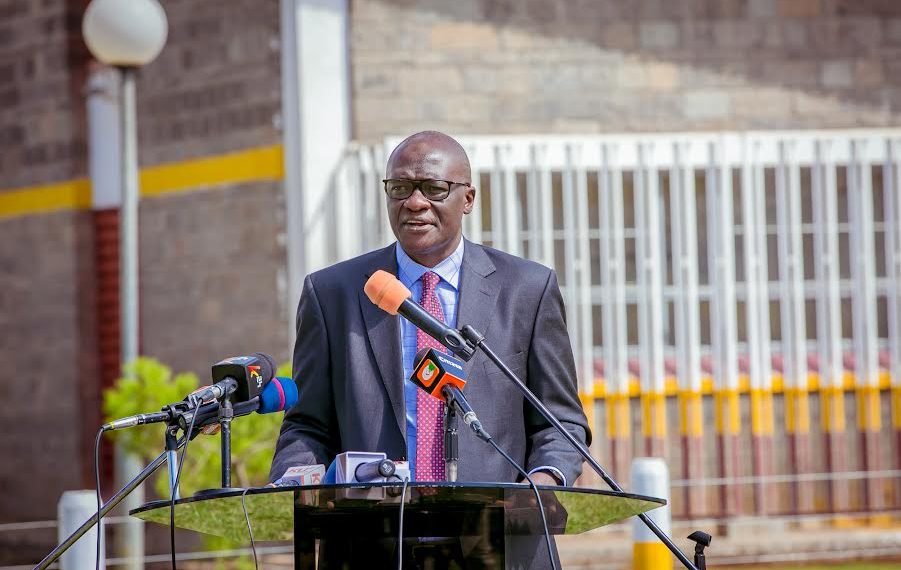By Samwel Doe Ouma @samweldoe
Studies in other low-income countries have shown that cryotherapy has an 88 per cent cure rate for pre-cancerous cervical cancer.
The Ministry of Health will train students from Kenya Medical Training Colleges (KMTC) to treat cervical lesions that could develop into cancer using extreme cold that destroys abnormal cells after the government got three machines for the procedure from Jhpiego. Jhpiego is a non-profit organization affiliated with John Hopkins University.
The students will learn to use cryotherapy, a method of treating pre-cancerous lesions where the clinician inserts a small stick and tip called a cryoprobe attached to a supply of liquid Nitrogen or Carbon Dioxide. The machine used the gases to freeze and destroy the abnormal cells that are not yet cancerous but could develop into cancer if not treated.
Dr Patrick Amoth, the Director-General for Health, said the cryotherapy and thermoablation machines would boost Kenya’s war against cervical cancer. He added that having the equipment in the colleges is in line with the pillars of Kenya’s strategy to control cancer, which prioritizes diagnosis, treatment, financing and research.
“Cervical cancer is preventable and treatable if diagnosed early, yet it remains one of the most common cancers in Kenya. A lack of training and skills for cancer screening among primary healthcare workers is a major setback in cervical and breast cancer control in Kenya,” Dr Amoth added.
“These devices will go along away in equipping the training labs at the campus to enhance the students’ skills in treating cervical pre-cancerous lesions,” Dr Amoth said.
The sexually transmitted Human papillomavirus (HPV) causes most cervical cancers. According to the latest data from the World Health Organisation, it is the second most common and deadliest cancer that claimed 3,211 lives of women above the age of 30 years in Kenya alone in 2020. Screening women regularly can pick pre-cancerous lesions, which take many years to develop into full-blown disease. However, compromised immune systems, such as those who are HIV positive, accelerate the progress of the disease. As a result, women with HIV are six times more vulnerable to developing invasive cancer.
Head of the Division of National Cancer Control Programme, Dr Mary Nyangasi, said that the country has embraced the WHO call to eliminate cervical cancer and is working towards achieving the 90:70:90, which means by 2030, the government should have vaccinated 90 per cent of all eligible girls between 10 and 14 years, screen 70 per cent of all eligible women and 90 per cent of all those found to have cervical disease treated.
“There is no reason we cannot eliminate cancer, and we have all the tools to tackle the disease,” said Dr Nyangasi.
Administering the HPV vaccine to girls between 9 and 13years could also protect women from Cervical cancer. The government has put the HPV vaccine as part of the routine vaccines administered through the National Vaccine and Immunization Programme since 2019. According to the Ministry of Health’s data, the government has already administered 61 per cent of the first dosage.
Dr Stephen Mutwiwa, Jhpiego’s Country Director, said that the country needs effective treatment in addition to the prevention efforts. He said that apart from the equipment, the non-profit will also support the colleges to teach the students how to identify the pre-cancerous lesions in the cervix using a technique called Visual Inspection with Acetic Acid (VIA).
VIA involves applying dilute acetic acid solution (vinegar) to the cervix. Lesions turn a white colour, and the clinician can offer cryotherapy. There are other methods of treatment, such as Loop Electrosurgical Excision Procedure (LEEP), which uses a wire loop heated by electric current to remove cancerous cells and tissues in the cervix and the thermal ablation method. Studies in India have shown that cryotherapy has a cure rate as high as 88 per cent.
Dr Kelly Oluoch, KMTC’s Chief Executive Officer, said early diagnosis and effective treatment to reduce the death of women with cervical cancer depends on health workers’ knowledge.
“The Kenya Medical training college graduates the largest number of health workers, and their training is a part of the long-term strategy to ensure continuity and sustainability of the government’s efforts against cancer,” Dr Oluoch said.














